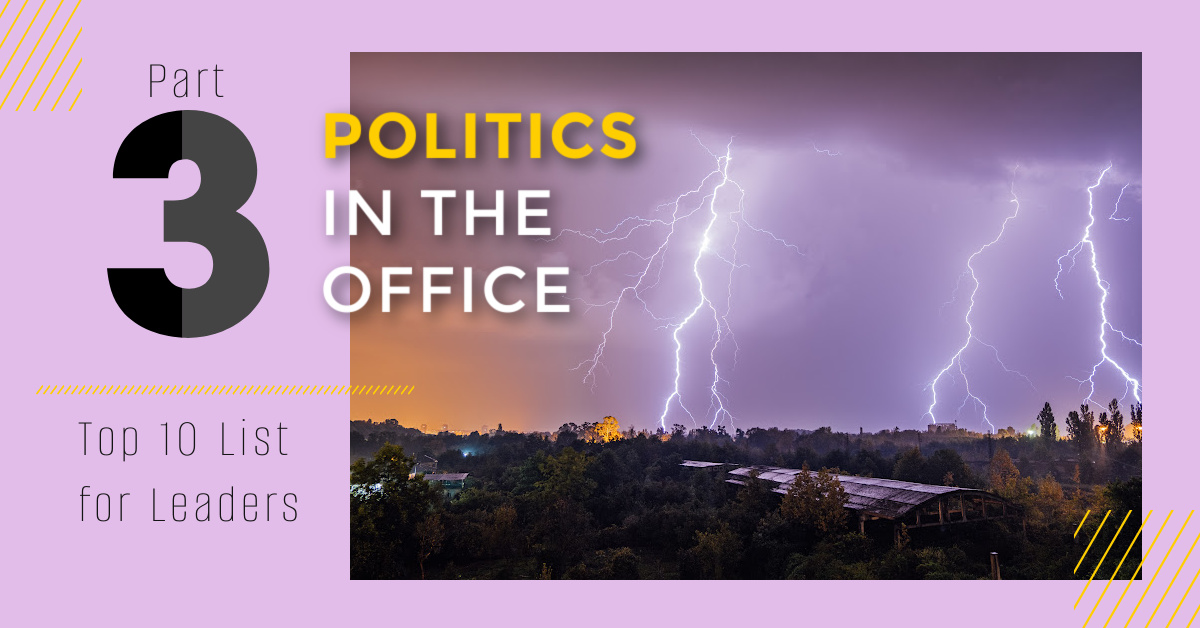
Top 10 List for Leaders
By Beth Schaefer
IPD Director
Despite your best efforts for a creating a respectful workplace for civil discourse (See Part 1 and Part 2 of Politics in the Office), the day after the election, there will be winners and losers. Do not assume everyone on your team will share your own response to the election results.
And…as the first 2 parts discussed, it is not just about red and blue, but about policies that will affect people’s families, economic status, religious beliefs, and healthcare. Regardless of who wins, the people on your team will face an unknown future. And, the unknown can bring fear, and fear can bring stress.
Consider these 10 strategies to assist your team through the most-intense weeks before and after the election:
- Accept a decrease in productivity. Just like the December holidays or a warm sunny summer afternoon in Minnesota, the pace of work will slow down. Plan for it rather than fight it.
- Plan your schedule and deadlines. If you know that your team will be especially distracted during the weeks before and after the election, avoid creating deadlines for your most critical projects or project pieces during that time.
- Focus on work. While productivity may decrease, you are still in the workplace. You can direct people to focus on work rather than half-day discussions at the water cooler. Consider tasks that are easy to complete. Perhaps that will be a good week to do some “housekeeping” work (updating files, cleaning emails) that improves productivity overall but is easy to do.
- Model respectful discourse. If you set political discussion boundaries, remind your team that they are still in effect after the election too. If you did not set boundaries, consider doing so. Be ready to respectfully end political discussions that are too long or are disrespectful.
- Be consistent. Treat all your team members the same even if their politics are different than yours. Make sure the guidelines you put in place are evenly enforced. If someone’s political discourse is disrespectful or harassing, as the leader, you need to address it. See Part 2 for strategies. When your team sees that you are serious about a safe space at work, it can reduce their stress.
- Schedule check-ins. If you do not currently do 1:1 check-in with your team members, this may be a good time to start. Use check-in time to see if they are feeling extra stress in general. You can do this without asking about political preferences. If they are having trouble focusing, suggest work that needs to be completed, but is not too challenging. This is also a good time to address any political talk that is not following the guidelines.
- Listen with empathy and seek to understand. Even if your politics are different, you can still listen to why people are disheartened by the results and provide empathy. See the article Heard! for a review of empathetic listening strategies.
- Suggest a media break. If the elections seem to be stressing out members of your team, suggest they step away from media and social media for a few days. Research is clear that social media can compound stress.
- Be ready with resources. Have your organization’s Employee Assistance Program links at the ready. Share them with individuals as needed or proactively share them with your team.
- Care. While this article is framed through the lens of workplace productivity, genuinely caring about your individual team members is one of the best ways to help them avoid burnout– whether it is due to the election or any other endless factors that contribute to life and work stressors.
Follow Up Note: In the Part 2 article, I failed the beginning assessment for leaders. I am happy to report that since I wrote that article, my organization provided training to staff and leaders on what types of political activity are acceptable in our workplace. The session was informative and clarified several guidelines for me. Since I work in education, our workplace guidelines are probably a bit trickier than most, and that made the training all the more helpful.
Resource List
7 Ways Employers Can Help Combat Election Anxiety in Their Workforce
How HR Can Guide a Workplace Through the Fraught 2024 Election Season
Navigating Pre- and Post- Elections Tensions in the Workplace
Polarizing Politics: How Leaders Can Protect and Support Psychological Safety in the Workplace

